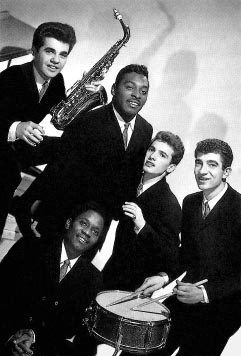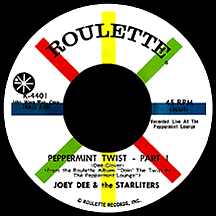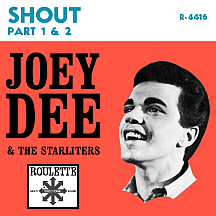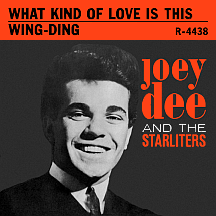JOEY DEE AND
THE STARLITERS
So...have I got a group of Jersey boys for you! With a leader who figured out what he wanted and, thanks to a few well-timed breaks, got it. Joseph Di Nicola was born in Passaic, a six hour walk (or 30 minute drive) to the heart of New York City. As the eighth child (and youngest son) of ten, he constantly listened to the radio: big band and country music mainly, plus he gained an appreciation for the music of Poland from the many Polish immigrants in his neighborhood. All in all, he had well-rounded musical tastes; Newark's WNJR, primarily a rhythm and blues and jazz-formatted station, was a major discovery in the '50s; the sounds he heard made a huge impression. A song the station played a lot in 1959 became a favorite: "The Twist" by Hank Ballard and the Midnighters.
So, Joey formed a band: the bug bit him as a 16-year-old sophomore at Passaic High School in 1953. Drummer pal Anthony Sciuto (nickname: "Dutch") was first to join The Thunder Trio, as they called it, due to all the noise they planned to make. Joey played harmonica (the cheapest instrument he could buy); within a couple of years he graduated to the saxophone and the band's roster included Tony Seragusa on upright bass, trumpeter Ernie Cassini, guitarist John Yanick and accordionist-singer Ralph Fazio. They played at YMCAs and for Catholic youth organizations and various charities between N.Y.C. and other parts of Jersey and soon had a regular Saturday night gig at the Passaic Armory. After high school, the guys took day jobs driving trucks and installing aluminum awnings. Around 1955, he changed the band's name to The Starliters, a reference to fave groups the Midnighters and The Moonglows.
Then a break came their way: a chance to perform on one of television's most popular variety shows. An August 1956 installment of Ted Mack's Original Amateur Hour featured the Starliters with the same lineup minus Yanick, who'd been replaced by guitarist Vinnie Corrao. They performed an original song, "Don't Come Barking Up My Tree." Sciuto's bass drum had "Dutchie" silk-screened on it and Joey played sax while sitting and/or standing on the side of Seragusa's bass; when host Mack asked, "Where'd you get the idea for ridin' on that bass?," Joey (the shortest member of the group) replied, "I was the only one who could fit in the saddle." They fashioned themselves after famously entertaining stage acts like Bill Haley's Comets and Louis Prima's Witnesses led by Sam Butera, a high bar eventually reached in their own youthful way.
So they finally made their first record: by 1958, the band had diversified with the addition of guitarist David McLane and vocalist Rogers Freeman, both African-American, a move that was not without precedent (The Dell-Vikings and a few other acts had thrived with integrated lineups). Joey wrote two solid doo wop songs about the same subject: a girl named "Lorraine," who was "The Girl I Walk to School." The ballad/uptempo pairing, with Freeman handling vocals, was released on the Little label (which, judging by the record's lack of success, lived up to its name). Vinnie Corrao left for the jazz scene and later performed with many great artists including Ella Fitzgerald and Brother Jack McDuff. Other shifts in late '50s personnel made way for a pianist, Oresti Intorella, and another black musician, drummer Willie Davis. During a gig a couple of miles from home at Garfield High School, Dee met David Brigati, the lead singer of The Hi-Fives, a vocal quintet that recorded for Decca Records; Joey sang backing vocals on a few of the group's recordings and eventually convinced David to throw in with the Starliters.
Then a well-known girl group did them a favor. Shirley Owens, Doris Coley, Addie Harris and Beverly Lee attended Passaic High and Dee couldn't help being in awe of these slightly-younger students he'd known who became The Shirelles and had already scored a couple of hit records. Well, it pays to have connections: they got them in the door with Scepter Records owner Florence Greenberg. They worked with producer Luther Dixon on the ballad "Face of an Angel," with a lead vocal by Brigati; for reasons uncertain, the single was released under the name Joey Dee and the Starlights. One other single, early live track "(Bad) Bulldog" (this one credited simply to Joey Dee), sat on the shelf until fame came...and it was coming soon! While gigging at Oliveri's nightclub in Lodi on the northern edge of Passaic, a New York-based agent, Don Davis, signed them on the dotted line and sent them off for a brief appearance at a club in New York. Just a small place, nothing all that special.
So it was like this: in 1960, some mobsters bought a small club at 128 West 45th Street that had been in business a couple of years. In September, the Starliters were booked for a single performance with a chance to stay a few more nights if the owners liked them. They made such a splash that the management dumped the regular house band, Jimmy Vee and the Scamps. Joey and the Starliters, with newer members, singer Larry Vernieri and organist Carlton Latimore, spent the next 13 months performing there every night. "The Twist," Chubby Checker's cover of Ballard's original, was topping the charts; young female dancers, an early version the "go-go girls" of the mid-'60s, were added to complement the Starliters' stage antics. The atmosphere was electric. Before long, word got out about Manhattan's latest hot spot: the Peppermint Lounge!
So all it took was for movie star Merle Oberon to do a little "twisting"...and everyone followed her to the Lounge. Society gossip columnist Igor Cassini (the second writer to use the pseudonym Cholly Knickerbocker) spread the word in his newspaper column about Oberon letting her hair down at the Lounge. The very next night, long lines of people clamored to get inside, police were called in and barricades were set up to separate the huge crowds from traffic. Throughout the Starliters' yearlong residency, the Peppermint Lounge became a playground for all manner of celebrities: actresses Judy Garland, Shirley MacLaine, Shelley Winters and Ava Gardner, authors Truman Capote and Tennessee Williams, musicians Nat "King" Cole and Liberace and notorious tabloid bait like Sal Mineo, Jayne Mansfield, John Wayne and even First Lady Jackie Kennedy. Everyone was twisting their brains out!
Then along came this female trio with dreams of a show business career. While standing in line hoping to get in, a club employee mistook Nedra Talley and sisters Estelle and Veronica Bennett for dancers he'd hired and escorted them to the bandstand. They danced onstage with the group and were hired as regulars; soon the trio joined the band on versions of songs like Ray Charles' hit "What'd I Say." In the summer of '61 they made their first record for Colpix, "I Want a Boy," as Ronnie and the Relatives; later, under the name The Ronettes, they toured with Joey and the Starliters before heading to Los Angeles to record a string of hit singles with producer Phil Spector. Around the same time the Starliters did some studio sessions for Atlantic Records that never saw the light of day. In the fall, Morris Levy (a music exec with mob ties of his own) offered to record them live at the Lounge. They took him up on it.
So, finally...a hit record! The resurgence in the popularity of the twist (adults were doing it in '61, whereas teenagers had controlled its first wave of popularity the previous year) and its prominence in the club made the choice to do a new "twist" song inevitable. Roulette producer Henry Glover called the shots on the live recording and its first single, "Peppermint Twist" (divided into two parts on the 45). Penned by Dee and Glover, the line 'One, two, three, kick! One, two, three, jump!' wasn't as impromptu as it sounds (the "peppermint" version of the dance purposely added a leg-kick, demonstrated nightly by the group and their dancers). Joey had to be convinced to sing the lead vocal...his first attempt. It began climbing the charts in November 1961 and even faced minor competition from a different recording (with the same title) on the Carlton label by singer Daniel Lamego fronting Danny Peppermint and the Jumping Jacks.

Then, Joey Dee became a movie star. It was inevitable...or maybe it wasn't...but it happened. Hey, Lets Twist, directed by Greg Garrison and released by Paramount, gave a fictionalized account of Dee's career and the rise of the Peppermint Lounge. The group cruised through several songs in the film, including the title track and its B side, "Roly Poly." Teddy Randazzo co-starred, Jo Ann Campbell sang "Shake Me Baby" and veteran singer-actress Kay Armen did "Let's Twist." Joe Pesci, 18 at the time, gigged with the Starliters and made his first film appearance as a dancer. Don't blink, or you'll miss him. After the movie's December 31 premiere, it took just three more weeks for "Peppermint Twist" to reach number one on the charts, knocking Chubby Checker's "Twist" off the top spot! Doin' the Twist at the Peppermint Lounge was a top seller as well, reaching number two on the album charts. A studio version of The Isley Brothers' classic "Shout" was staged as a live performance in the film. Dee's earlier version from the album was released as a single (again, in two parts) and went top ten by the end of April; at one point they had four songs on the Hot 100 simultaneously. Though many, including Joey Dee, considered Hey, Let's Twist a "B" film, Hal Hackady, who wrote the screenplay, received a nomination from the Writers Guild of America for Best Written American Musical. Dick Clark, who had championed Checker's recording from the start, welcomed Joey and the Starliters on American Bandstand many times...and presented them with a gold record for "Peppermint Twist" on the show.
So the movie made money and a follow-up was planned. Two Tickets to Paris (original title: Vive Le Twist), also directed by Garrison and written by Hackady, is notable mainly for "What Kind of Love is This," a song written by Houston-born singer-songwriter Johnny Nash, the group's first non-dance hit and fourth to reach the top 20 in less than ten months. Another Nash composition, "I Lost My Baby" (sans Starliters on the label), had a mid-chart run in the fall. By the time the movie opened in November, Dee and the guys were touring Europe; The Beatles opened for them in Stockholm, Sweden at about the time "Love Me Do" was hitting the charts in their native England. In the spring of '63, "Hot Pastrami with Mashed Potatoes" went head-to-head with The Dartells' similar "Hot Pastrami" and became the last top 40 hit for Joey's Starliters. The next three singles, "Dance, Dance, Dance," a remake of Lee Dorsey's "Ya Ya" and "Getting Nearer" with backing vocals by the Ronettes, fared poorly.
So, was there anything to Joey's claim that he was good at spotting talent? In 1964, Joey and David toured with a new group of Starliters: Felix Cavaliere, Gene Cornish and David's brother Eddie Brigati. They didn't stick around long, venturing forth with the addition of drummer Dino Danelli as The Rascals (adding and later dropping the word "Young" from their name) and became one of rock's hottest bands through the end of the decade. For a short time in 1965, a wildly talented guitarist from Seattle who called himself Maurice James did some touring in the Starliters band. He became better known a couple of years later as Jimi Hendrix.
Then came the difficult phase of his career, though Joey, without his usual bandmates, persisted: the 1965 single "Cry a Little Sometime" became his final Roulette release. Four singles appeared on Jubilee (with a curious spelling of Starlighters) in 1966 and early '67: the pseudo-psychedelic "Feel Good About It," low-key party song "Dancing on the Beach" (its vibe at odds with the more feverish live Lounge tracks), lo-fi dance track "It's Got You" (penned by Billy Vera and Chip Taylor) and a return to basics with a live rendition of The Dovells' '63 smash "You Can't Sit Down." Reuniting with Dave Brigati and Larry Vernieri as Joey Dee and the New Starlighters, a self-released effort on the Caneil label written by the trio, "How Can I Forget," deserved better than near-complete obscurity.
So that's where things left off in the 1960s. Attempts at rejuvenation in the following decade include the Vera-Taylor song "Storybook Children," a 1972 duet with his wife, Lois Lee (a hint of things to come), and two from '73: "Wasn't it a Heavy Summer," a feel-good pop tune by Hawk featuring Joey Dee on Sunburst and a nearly-unrecognizable vocal performance on "Baby Don't You Know (I Need You)" on Janus. He continued performing for decades, with and without former Starliters, mostly in eastern U.S. states, as the band gradually became a family affair. Joey Dee has enjoyed an eventful career lasting seven decades...and he's been known to brag about it, which is his right. But there's truth to the statement...because I just said so.
NOTABLE SINGLES:
- Lorraine /
The Girl I Walk to School - 1958 - Face of an Angel - 1960
as Joey Dee and the Starlights - Peppermint Twist - 1962
- Hey, Let's Twist /
Roly Poly - 1962 - Shout - 1962
- Everytime (I Think of You) - 1962
- What Kind of Love is This - 1962
- I Lost My Baby - 1962
by Joey Dee - Baby, You're Driving Me Crazy - 1963
by Joey Dee - Hot Pastrami with Mashed Potatoes - 1963
- Dance, Dance, Dance - 1963
by Joey Dee - Ya Ya - 1963
- Getting Nearer - 1964
by Joey Dee - Cry a Little Sometime - 1965
by Joey Dee - Feel Good About It - 1966
as Joey Dee and the Starlighters - Dancing on the Beach - 1966
as Joey Dee and the Starlighters - It's Got You - 1967
as Joey Dee and the Starlighters - You Can't Sit Down - 1967
as Joey Dee and the Starlighters - How Can I Forget - 1967
as Joey Dee and the New Starlighters - Roses and Candy Kisses - 1970
as Joey Dee and the New Starliters - Storybook Children - 1972
by Joey Dee and Lois Lee - Wasn't it a Heavy Summer - 1973
by Hawk featuring Joey Dee - Baby Don't You Know (I Need You) - 1973
by Joey Dee




